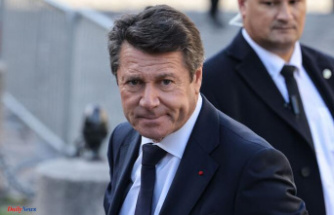A study shows that Russian conspiracy myths are becoming increasingly popular in Germany. Author Pia Lamberty is not surprised: Years of propaganda have found fertile ground in the crisis. Moscow is pursuing a goal - which it is already getting closer to.
"To put it bluntly: the Russians are taking away the weapons from the Nazis," claims the German-Russian influencer Alina Lipp in an Internet video that she shows in Russian-occupied Donbass in Ukraine. In a ZDF interview, the YouTube star Sergey Filbert is certain that "the West provoked Russia." The topics covered on his channels include Bill Gates, who wants to "reduce the population" and the USA, which is doing research in secret bioweapons laboratories in Ukraine.
They are absurd theories. Russian propaganda that unmasks itself with every day of the war, with the pictures from Bucha and Irpin, with the shelling of Ukrainian schools and clinics and with Putin's sham referendums. At least you should think so. Because it is exactly these pro-Russian conspiracy myths that have been gaining ground in Germany since the beginning of the war, as a representative survey by the Center for Monitoring, Analysis and Strategy (CEMAS) shows. In April, for example, 12 percent of respondents believed that Russia had been forced to attack Ukraine because of NATO provocations. Now it is already 19 percent. Almost as many believe that Putin is taking action "against a global elite that pulls the strings in the background." how come
"Russian propaganda seeped in for years," says Pia Lamberty, one of the authors of the CEMAS study on ntv.de. The social psychologist has been dealing with the spread of conspiracy myths for years. She had already observed the pro-Russian and anti-American attitude of this scene at the Monday vigils in 2014. "They've solidified since then."
A huge network is helping Moscow in this: Influencers like Lipp and Filbert feed their hundreds of thousands of followers on YouTube and Telegram and other platforms with anti-Western content every day. The situation is similar on the social media channels of Russian embassies - for example when they accuse Great Britain of having carried out a terrorist attack on Sevastopol together with Ukraine. The original media source of Russian propaganda in Germany, the broadcaster RT Deutsch, continues to spread its content despite the ban. The Kremlin myths make it into the Bundestag - mainly through statements by AfD politicians. For example, MP Eugen Schmidt has repeatedly portrayed Germany in the Russian media as an unjust state in which dissenters are threatened by "the ruling elite" with censorship and physical violence, as reported by ARD.
"All of this has fallen on particularly fertile ground over the past few months," explains Lamberty. Germany is struggling with the energy crisis and inflation - the rising prices are difficult for many to cope with. "When people feel like they're losing control, conspiracy stories can seem like a solution," says the expert. "Because they give simple, supposed explanations for complex relationships in the world."
According to the study, a particularly large number of people in East Germany follow this path. Almost every third person there believes that because of NATO, Russia had no choice but to wage aggressive war. In the west, at 16 percent, it is only half as many. A similar picture emerges from the thesis that Ukraine has no territorial claims of its own. There are many reasons for this, says Lamberty. The anti-Americanism, which is more pronounced in many East German regions, certainly plays a role.
Uncertainties could also arise, especially in the East, from bad memories of economic ruptures and mass unemployment. From a purely economic point of view, eastern Germany is not more severely affected by the crisis, explains Oliver Holtemöller from the Leibniz Institute for Economic Research in Halle (IWH) to the dpa. "But of course that says nothing about their feelings."
Many people, especially in East Germany, have been expressing this dissatisfaction for several weeks in protests against the government's energy policy. Striking: Whether in Bautzen, Dresden, Chemnitz or Leipzig, many of the demonstrators wave Russian flags. There are repeated calls for the end of sanctions against Russia and a halt to arms deliveries to Ukraine. "Germany must no longer be a puppet of American interests and serve a murderous proxy war," Deutschlandfunk quoted a demonstrator in Leipzig as saying.
This is not surprising for social psychologist Lamberty. "We have already seen during the pandemic that belief in conspiracy stories and the willingness to protest in relation to corona measures were related." A certain core has now simply switched from the lateral thinker demos and walks to energy protests and resistance to the Russia sanctions. Lamberty explains that anyone who believed in Corona conspiracies "also believes more easily in pro-Russian propaganda".
An example is the "Free Saxony". The smallest party was often behind the anti-corona demos and now also plays an important role in mobilizing for the energy protests. In its Telegram channel, the group not only advertises so-called Monday walks in dozens of cities every week, but also the upcoming event "Ami go gome - large demonstration against occupiers". The group was classified as right-wing extremist and is being observed by the Office for the Protection of the Constitution - apparently not unusual in the protests. Of course, that doesn't mean "that everyone who demonstrates against energy prices is a right-wing extremist or a conspiracy ideologue," stresses Lamberty. In parts of the left-wing scene, for example, one can observe a trivialization of Russia's war in Ukraine. However, "there is definitely a stable, anti-democratic to right-wing extremist milieu that initiates the protests or tries to take advantage of them," says the expert.
That harbors dangers. Radical groups often use conspiracy theories to politically steer their supporters. Lamberty recalls a disinformation campaign from spring, according to which Ukrainian refugees murdered a young Russian. The story quickly turned out to be false, but "new enemy images have already emerged," explains the expert. This will be fueled further when politicians normalize the pro-Russian myths, such as the allegation of social tourism by Union Chairman Friedrich Merz. Lamberty adds that it is not yet known exactly what the consequences will be. But empirically, there is definitely a connection between belief in conspiracy stories and violence and devaluation of people in the form of anti-Semitism, racism or hatred of refugees. "And we are already seeing more attacks against Ukrainian refugees."
Alleged energy protests by insults by Ukrainians are noticed again and again - most recently a demonstrator insulted a refugee as a Nazi. In Sehnde in Lower Saxony, near Wismar in Mecklenburg-Western Pomerania, in Bautzen and near Leipzig, within a few weeks there were attacks on refugee homes where Ukrainians lived and were supposed to live. A stranger daubed a swastika on accommodation in Rostock. Overall, attacks on refugee homes have increased again this year, as the Federal Ministry of the Interior recently reported. 65 attacks have been counted since January - almost as many as in all of 2021.
All of this benefits the goals of Russian propaganda and disinformation. In essence, it is about "destabilizing society and shaking confidence in the government," according to the study. Lamberty summarizes the seriousness of the situation as follows: "Russian conspiracy myths are no longer just an information problem, but a democracy problem."












